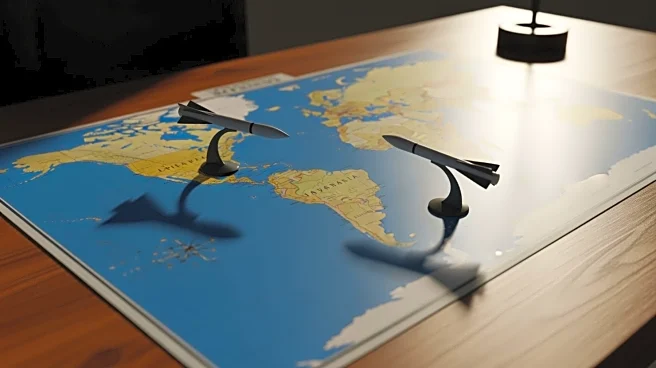What's Happening?
President Volodymyr Zelensky met with President Trump at the White House to discuss the potential supply of Tomahawk cruise missiles to Ukraine. Despite Zelensky's interest in using these missiles to target Russian oil and energy facilities, Trump remained
non-committal, citing concerns over escalation. The meeting followed a phone call between Trump and Russian President Vladimir Putin, where they agreed to meet in Hungary for further discussions. Zelensky expressed hopes that the Tomahawks could weaken Russia's war economy, but Trump emphasized the need to avoid escalation. The Ukrainian leader suggested a potential exchange involving drones, but no definitive agreement was reached.
Why It's Important?
The meeting between Trump and Zelensky is significant as it highlights the ongoing geopolitical tensions surrounding the Ukraine-Russia conflict. The potential use of Tomahawk missiles represents a strategic shift that could alter the dynamics of the war, impacting both military and diplomatic efforts. Trump's cautious approach reflects the delicate balance the U.S. must maintain in supporting Ukraine while avoiding further escalation with Russia. The discussions underscore the complexities of international diplomacy, where military aid decisions can have far-reaching consequences for regional stability and global relations.
What's Next?
The upcoming meeting between Trump and Putin in Hungary could be pivotal in shaping the future of the Ukraine conflict. As both leaders prepare for discussions, the international community will closely monitor any agreements or shifts in policy. Zelensky's outreach to European leaders suggests a coordinated effort to strengthen Ukraine's position and seek broader support. The potential for further negotiations involving the U.S., Russia, and Ukraine could lead to new diplomatic strategies aimed at resolving the conflict.
Beyond the Headlines
The discussions around Tomahawk missiles highlight the ethical and strategic considerations in military aid decisions. The potential impact on civilian populations and infrastructure raises questions about the humanitarian implications of such actions. Additionally, the geopolitical maneuvering involved in these talks reflects the broader challenges of maintaining peace and security in a region marked by historical tensions and complex alliances.















